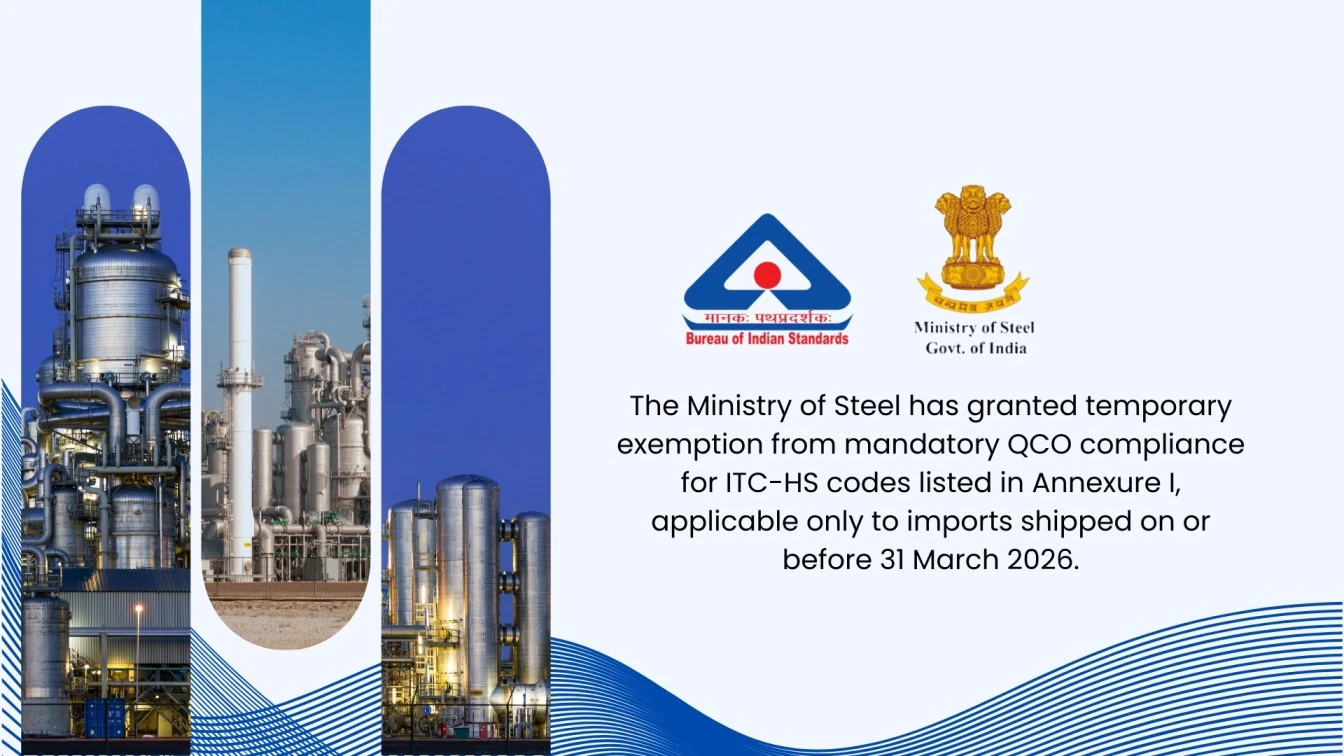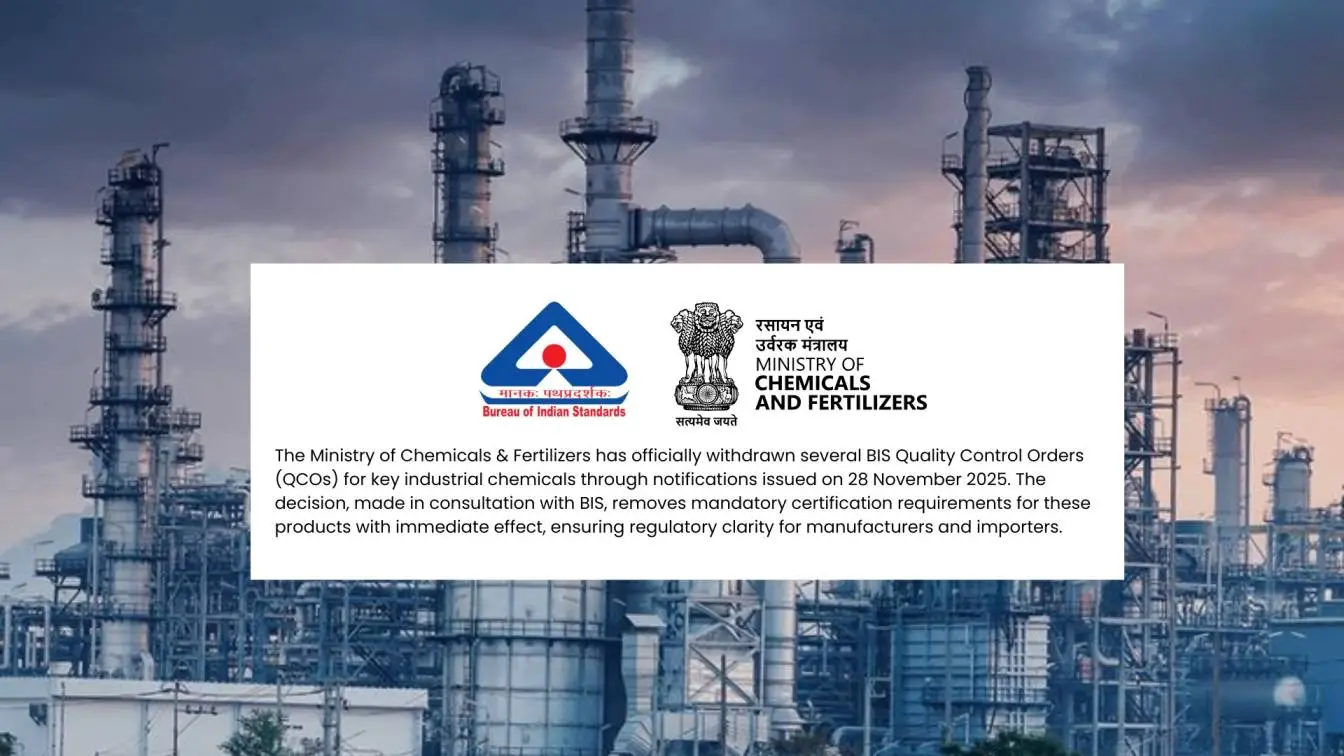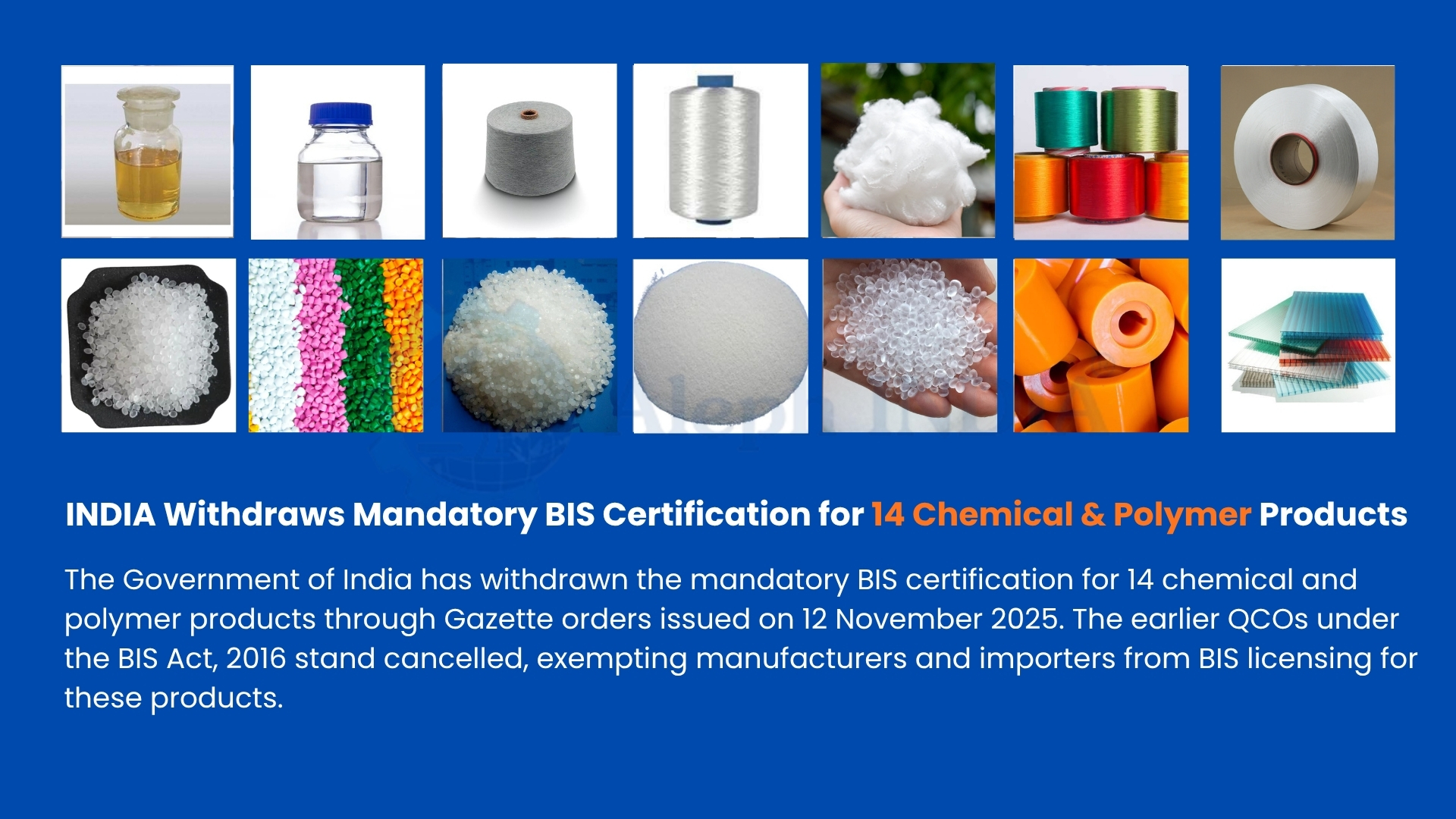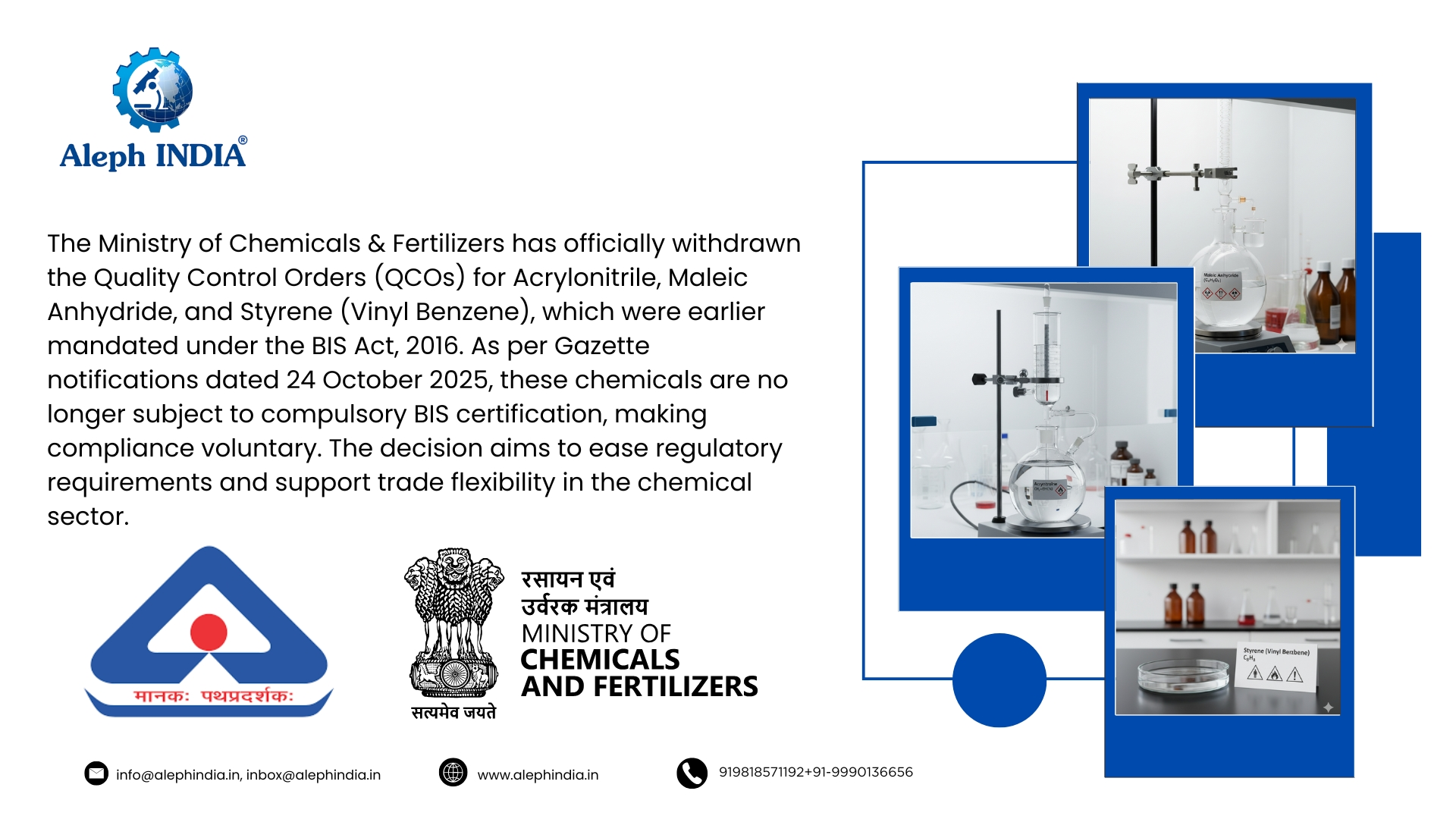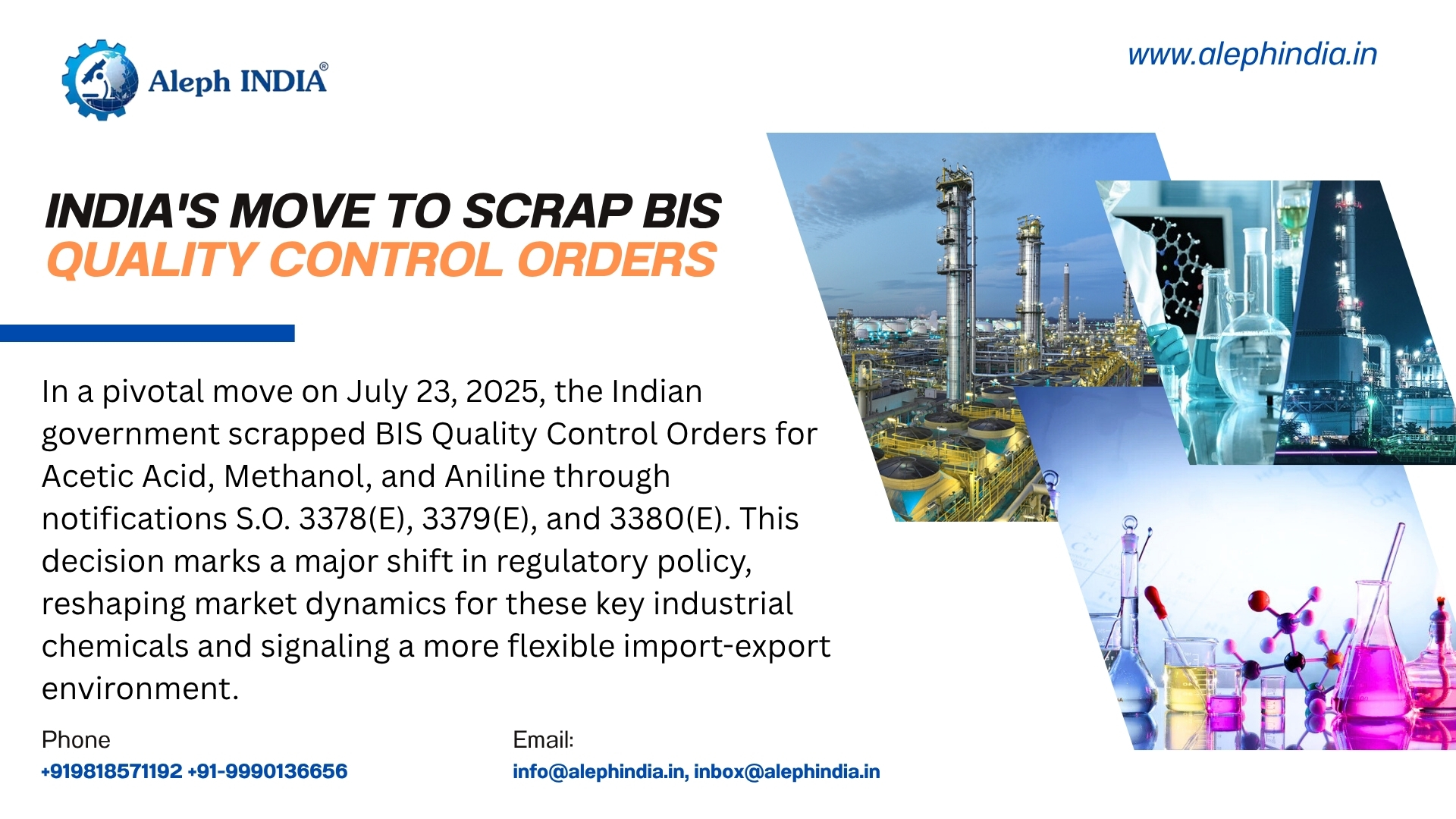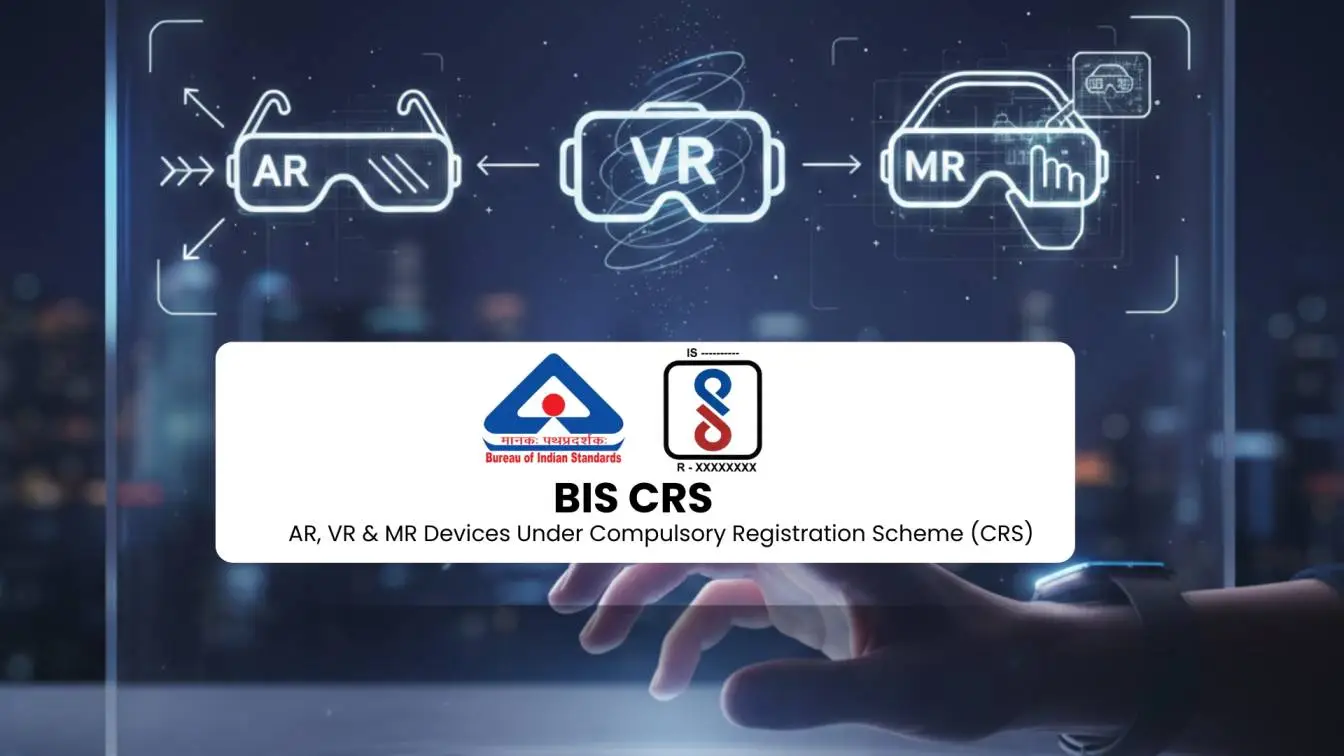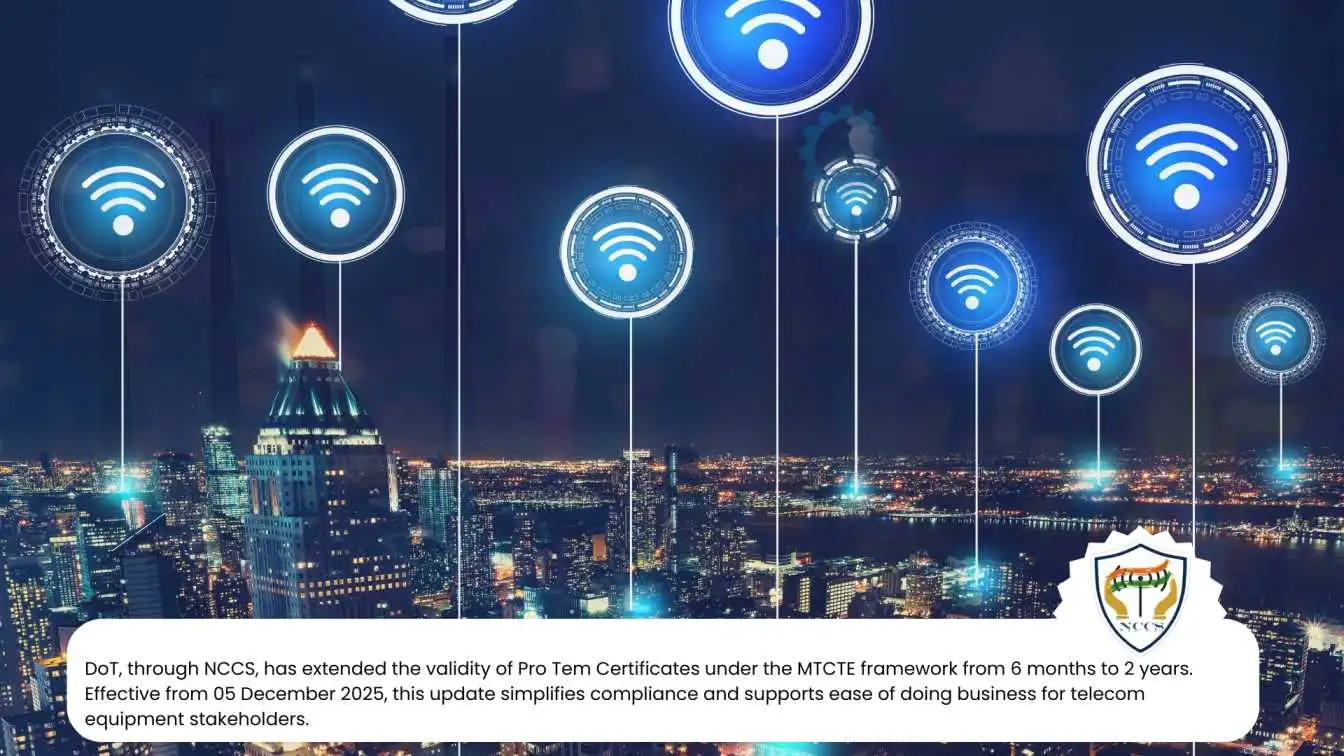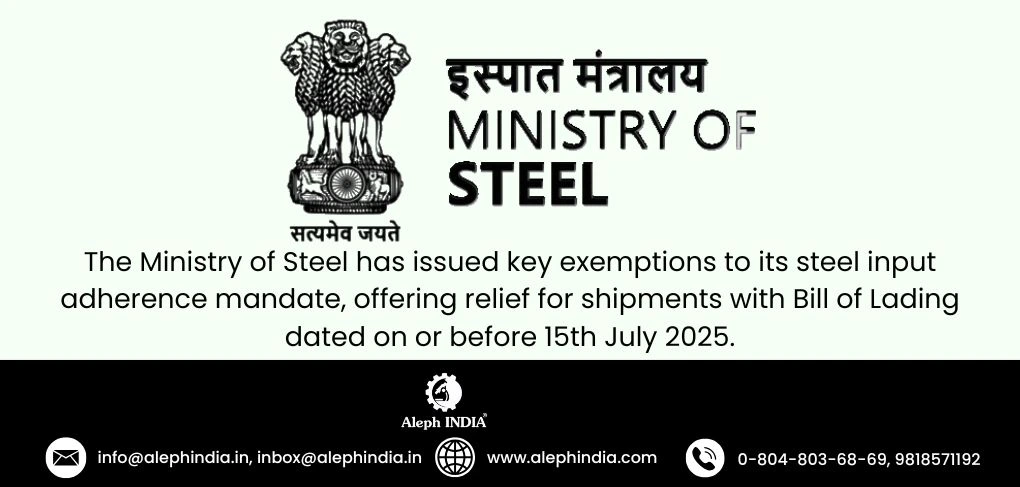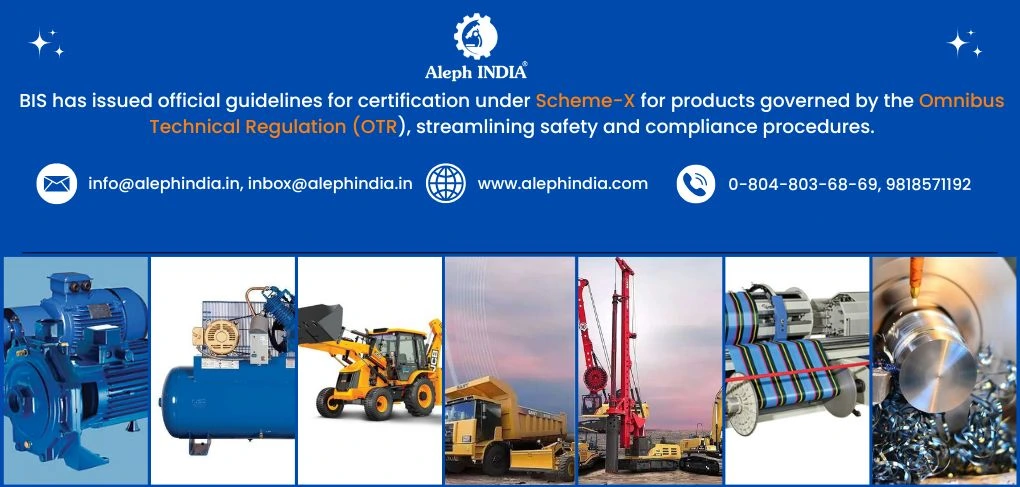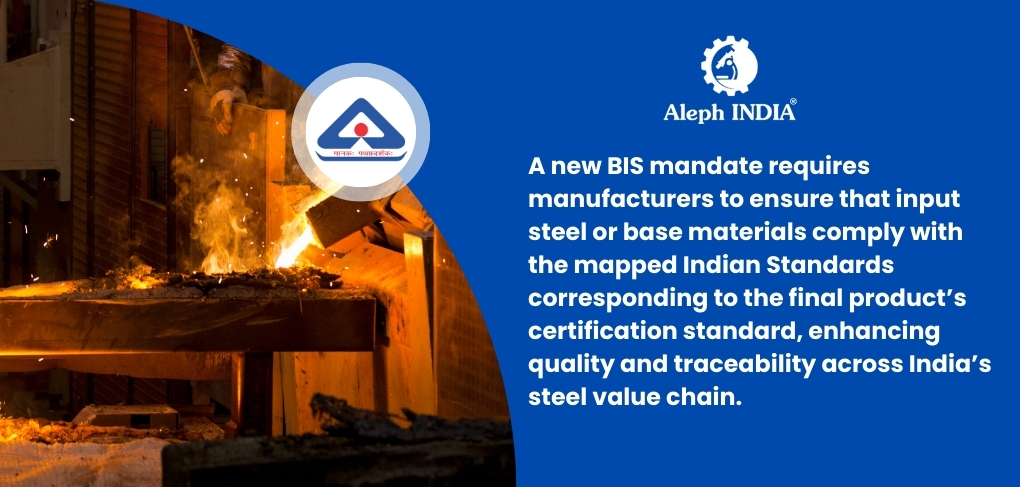- HOME
- ABOUT US
- SERVICES
-
LICENCE & CERTIFICATION
- BIS (ISI MARK) FOR FOREIGN MANUFACTURERS
- DOMESTIC PRODUCT CERTIFICATION (ISI MARK)
- BIS SCHEME X CERTIFICATION
- BIS CERTIFICATE OF CONFORMITY (CoC)
- BIS HALLMARKING
- REACH CERTIFICATION (GLOBAL)
- LABORATORY RECOGNITION SCHEME (LRS)
- WORLD MANUFACTURER IDENTIFIER (WMI) CODE
- ECO MARK
- TAC APPROVAL FOR AUTOMOBILE
- PESO CERTIFICATION
- SASO CERTIFICATION
- CDSCO CERTIFICATION
-
REGISTRATION
- BIS (CRS) REGISTRATION FOR ELECTRONIC PRODUCT
- WPC-ETA APPROVAL
- BEE CERTIFICATION
- E-WASTE MANAGEMENT (EPR)
- EPR REGISTRATION FOR PLASTIC WASTE MANAGEMENT
- EPR REGISTRATION FOR BATTERY WASTE MANAGEMENT
- EPR REGISTRATION FOR USED OIL
- LEGAL METROLOGY (LMPC)
- TEC/MTCTE APPROVAL
- CE CERTIFICATION
- UL CERTIFICATION
- ROHS LICENCE
- DRONE REGISTRATION
- MOEF LICENCE
-
AUXILIARY
- STANDARDIZATION (SCIENTIFIC) DIVISION
- TRAINING SERVICES (NATIONAL & INTERNATIONAL)
- IMPORT/EXPORT LICENCE
- FSSAI CERTIFICATION
- MSME/SSI/NSIC REGISTRATION
- ISO REGISTRATION
- BRAND REPRESENTATION
- LABORATORY EQUIPMENT AND SETUP
- TRADEMARK REGISTRATION
- MAKE IN INDIA SUPPORT
- AG-MARK LICENCE
- THIRD PARTY INSPECTION AND MONITORING SERVICES
-
- PORTFOLIO
- UPDATES
- CONTACT
- LOGIN
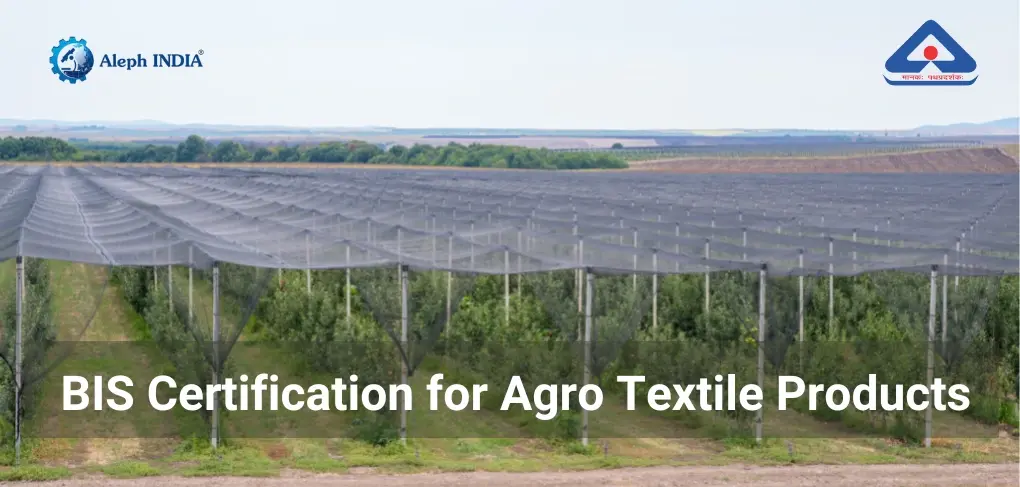
BIS Certification for Agro Textiles Products
Agro textiles such as shaded nets, insect nets, jute Agro textiles, woven, non-woven fabric, windshield nets, etc. are commonly used in agriculture and horticulture applications where the scorching heat of the sun and wind play a significant role in damaging crops. The changing climatic conditions throughout the year demonstrate the importance of Agro textile in maximizing growth and crop yields and protecting agricultural products from weather, scorching sun heat, weeds, birds, and winds.
Agro textile is used to meet the diverse needs of crops in the agriculture & horticulture sector. BIS certification for shade net, insect net, windshield nets, harvest nets etc. is required to ensure the quality of Agro textile products and use the standard mark. All Agro textile manufacturers must obtain a BIS certificate for non-woven crop covers, shade nets, woven ground covers, jute Agro textiles, and so on.
It isn't easy to survive in this competitive market without a standard quality and certified product. All manufacturers may be required to get a BIS license to manufacture, import, and sell products in the Indian market.
Let’s first take a closer look at what is BIS?
What is BIS (Bureau of Indian standard)?
Bureau of Indian Standards (BIS) is an Indian standard organization involved in the standard formulation, marking, testing, training, and quality certification of goods. BIS provides safe, high-quality goods, reduces health risks to consumers through standardization, certification, and testing, and promotes exports and import substitutes.
BIS license: BIS operates various certification programs to grant BIS licenses to Indian and foreign manufacturers after confirming that the product meets the specifications of a given Indian standard. BIS certification ensures that the public receives high-quality, reliable, safe, and risk-free products.
BIS licence allows you to use the standard ISI mark on your product and sell it in the Indian market. If you want to use a standard mark (ISI Mark) on any product, the manufacturer must first get BIS certification from the Bureau of Indian Standard. Unless the product bears the standard mark, it cannot be sold in the country (ISI Mark). To get BIS certification and use the standard ISI mark, the manufacturer must ensure that their product conforms to the specifications of the Indian standard. The presence of an ISI Mark on a product guarantee that it meets the requirements of the Indian standards.
Let's take a closer look at the BIS certification process for Agro Textiles:
How to get BIS certificate for Agro Textile?
The process of BIS certification for Agro Textile is as follows:
- Documentation: If you want to obtain BIS certification for an agricultural textile, you must prepare all necessary documentation before submitting your application.
- Application Submission: Once all relevant documents are prepared, the application form and supporting documentation will be submitted to the BIS Portal.
- Scrutiny of application: BIS officials will carefully review each and every document and application submitted.
- Audit of manufacturing premises: Following scrutiny, BIS will appoint an auditor to audit manufacturing premises. During the inspection of manufacturing facilities, BIS officials will draw a sample and send it to a BIS-approved laboratory for testing.
- Sample testing: All samples collected will be tested in a BIS-approved laboratory to ensure that the product meets the requirements of applicable Indian standards.
- Grant of BIS Licence: If the product complies with the specified standard, BIS will grant a BIS license to the manufacturer.
Agro Textile:
BIS has developed Indian standards for Almost every product for its specification and performance requirements. All imported and manufactured products are required to meet Indian standards as specified by BIS.
There are 22 Indian standards that specify the specifications and performance requirements of Agro Textile products like non-woven fabric, shaded nets, jute Agro textile, windshield nets, and insect nets for agricultural and horticultural applications.
| S.No. | Indian Standard | Title |
|---|---|---|
| 1 | IS 16718:2017 | Textiles-Polypropylene Spun Bounded Non-Woven Crop Cover Fabric for Agricultural and Horticultural Applications- Specification |
| 2 | IS 16008 (Part 1):2016 | Agro Textiles- Shade Nets for Agriculture and Horticulture Purposes- Specification Part 1 Shaded Nets Made from Tape Yarns |
| 3 | IS 16008 (Part 2):2016 | Agro Textiles- Shade Nets for Agriculture and Horticulture Purposes- Specification Part 2 Shaded Nets Made from Mono Filament Yarns |
| 4 | IS 16513:2016 | Agro Textiles - Insect Nets for Agriculture and Horticulture Purposes- Specification |
| 5 | IS 16202:2014 | Agro Textiles - Woven Ground Covers for Horticulture Application- Specification |
| 6 | IS 17070:2019 | Jute Agrotextiles for Growth of Plants and Suppression of Weeds- Specification |
| 7 | IS 15901:2010 | Agro Textiles- High Density Polyethylene (HDPE) Woven Beds for Vermiculture - Specification |
| 8 | IS 16089:2013 | Jute Agrotextile- Sapling Bags for Growth of Seeding/Sapling- Specification |
| 9 | IS 16190:2014 | Agro Textiles- High Density Polyethylene (HDPE) Laminated Woven Lay Flat Tube for Irrigation Purpose - Specification |
| 10 | IS 16390:2015 | Agro Textiles- Nylon Knitted Seamless Gloves for Tobacco Harvesters- Specification |
| 11 | IS 16627:2017 | Agro Textiles- High Density Polyethylene (HDPE) Laminated Woven Lay Flat Tube for Use in Mains and Submissions of Drip Irrigation System- Specification |
| 12 | IS 17355:2020 | Agro Textile- Propylene Spun Bonded Non-Woven Mulch Mat for Agriculture and Horticulture Application- Specification |
| 13 | IS 17356:2020 | Agro Textiles- Windshield Nets for Agriculture and Horticulture Purposes- Specification |
| 14 | IS 17357:2020 | Agro Textiles- Harvest Nets for Agriculture and Horticulture Purposes |
| 15 | IS 17358 (Part 1):2020 | Agro Textiles- Fencing Nets for Agriculture and Horticulture Purposes- Specification Part 1 Fencing Nets Made from Extruded Polymer Mesh |
| 16 | IS 17358 (Part 2): 2020 | Agro Textiles - Fencing Nets for Agriculture and Horticulture Purposes- Specification Part 2 Fencing Nets Made from Mono Filament Yarns and Combination of Tape and Mono Filament Yarns |
| 17 | IS 17513:2020 | Agro Textiles - Plant Support Nets for Agriculture and Horticulture Purposes - Specification |
| 18 | IS 17728:2021 | Agro Textiles - High Density Polyethylene (HDPE) Laminated Woven Lay Flat Tube and Fittings for Use in Rain Irrigation System - Specification |
| 19 | IS 17729:2021 | Agro Textiles- Flexible Water Storage Tank for Agriculture and Horticulture Purposes- Specification |
| 20 | IS 17730 (Part 1):2021 | Agro Textile- Hail Protection Nets for Agriculture and Horticulture Purposes- Specification PART 1 Wrap Knitted Hail Protection Nets |
| 21 | IS 17730 (Part 2): 2021 | Agro Textiles - Hail Protection Nets for Agriculture and Horticulture Purposes- Specification Part 2 Woven Hail Protection Net |
| 22 | IS 17731:2021 | Agro Textiles- Laminated Woven Orchard Protection Covers- Specification |
What is the cost of BIS certification for Agro Textile product?
BIS certification costs include an application fee, an audit fee, a sample testing fee, a license fee, and a marking fee. It also necessitates investment in factory facilities, particularly in the installation of testing machinery for in-house factory test labs.
Why BIS certificate is required for Agro textile?
- To ensure that the product is safe, reliable, and of high quality
- To ensure that the product complies with Indian standards.
- To sell the product in the Indian market
- To ensure that the product has been tested and certified
Conclusion:
Agro textile is widely used to meet the diverse needs of crops in the agriculture & horticulture sector. So as to assure Agro Textile quality and to use the standard mark, all Agro Textile manufacturers must obtain BIS certification for their HDPE woven beds for vermiculture, propylene spun bonded non-woven mulch mat, windshield nets, harvest nets, fencing nets, flexible water storage tanks, etc. However, compliance can be tricky, and obtaining BIS certification is not as simple as it first appears because it requires cooperation with officials, sample collection and testing, and meeting BIS requirements. Therefore, it is recommended that you seek professional assistance.
Aleph India is a leading BIS consultant that provides product testing, training, auditing, and technical compliance services for meeting Indian regulatory requirements. We assist the manufacturer in obtaining BIS certification and meeting all the needs of Indian standards for their products so that products can be manufactured and sold in the Indian market. Our BIS experts will assist you at every step of the process to ensure your business runs smoothly.
Aleph India is the first choice for manufacturers, importers, and brand owners because we provide the best regulatory compliance services. Our conformity assessment vertical will meet your certification needs while ensuring a smooth certification process.


